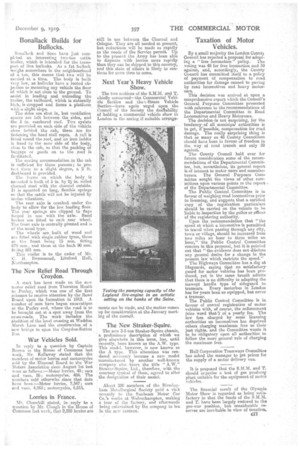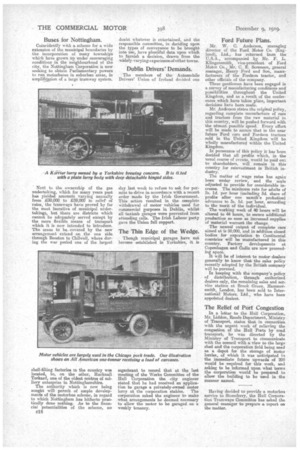Taxation of Motor Vehicles.
Page 5

Page 6

If you've noticed an error in this article please click here to report it so we can fix it.
By a small majority the London Counts Council has rejected a proposal for adopting a "free locomotion " policy. The voting was 48 for free locomotion and 59 against, and, accordingly, the County Council has committed itself to a policy of payment of compensation to road authorities for damage caused to paving by road locomotives and heavy motorcars.
This decision was arrived at upon. a comprehensive report which the Council's General Purposes Committee presented with reference to the recommendations of the Departmental Committee in Road. Locomotives and Heavy Motorcars. The decision 'is not surprising, for the tendency; of all municipal authorities is to get, if 'possible, compensation' for road damage. The really surprising thing is that as many as 48 County Councillors should have been in favour of freedom in the way of road transit and only 59 against. The County Council held over for future consideration some of the recommendations of the Departmental Committee, but, nevertheless, its general report is of interest to motor users and manufacturers. The General Purposes Committee sought the views of other committees upon various points in the report.. of the Departmental Committee. The Public Control. Committee is in favour of weighing road locomotives prior to licensing, and suggests that a certified copy of the registration particulars should be carried on the -vehicle to be liable to inspection by the police or officer of the registering authority. Upon the recommendation that "the speed at which aloComotive is permitted. to travel when passing through any city, town or village, should be increased from two miles an hoer • to three miles an. hour," 'the Public Control Committee concurs in this proposal, but it is pointed out that "the-evidence does not disclose any general desire for a change in the present law which restricts the speed."
The Highways Committee has a dig at lifeguards, saying Opt no satisfactory guard for motor vehicles has been produced, yet in the same breath admits that there is no difficulty in adapting the inswept hurdle type of sideguard to tramcare. Every motorbus in Landon has for years been so equipped, but never a tramcar.
The Public Control Committee is in favour of annual registration of motor vehicles with, of course, the enforcement (nice word that!) of a yearly, fee. The low fees charged by some licensing authorities on locomotives has deprived others charging maximum fees as their just rights, and the Committee. wants it to be obligatory upon all authorities to follow the more general rule of charging the maximum fees.
Hull Corporation Tramways Committee has asked the manager to get prices for the supply of a motor delivery van.
It is proposed that the S.M.M. and T. should organize a test of gas producer plant suitable for the equipment of motor vehicles.
The financial result of the Olympia Motor Show is regarded as being satisfactory in that the funds of the S.M.M. and T. have been largely restored to the pre-war position, but considerable reserves are inevitable in view of taxation,
Buses for Nottingham.
Coincidently with a scheme fur a wide extension of the municipal boundaries by the incorporation of many townships which have grown up under encouraging conditions in the neighbourhood of the city, the Nottingham Corporation is now seeking to obtain Parliamentary powers to run motorbuses in suburban areas, in amplifi%tion of a larg& tramway system.
Next to the ownership of the gas undertaking, which for many years past has yielded amounts varying annually from 230,000 to £30,000 in relief of rates, the tramways have proved by far the most lucrative of municipal undertakings, but there are districts which cannot be adequately served except by the more flexible means of transport which it is now intended to introduce. The areas to be covered by the new arrangement extend on the one side through Beeston to Chilwell, where during the war period one of the largest shell-filling factories in the country was located, to, on the other, Hucknall Torkand, one of the oldest centres of colliery enterprise in Nottinghamshire. The authority which is now being sought will permit of ample developments of the motorbus scheme, in regard to which Nottingham has hitherto practically done nothing. As to the financial potentialities of the scheme, no Ol 8
doubt whatever is entertained, and the responsible committee, in deciding upon the types of conveyance to be brought into use, have plentiful data upon which to. furnish a decision, drawn from the
clay last week to refuse to ask for permits to drive in accordanse with a recent order nude by the Irish Government. This action resulted in the complete withdrawal of motor vehicles used for commercial purposes in Dublin whilst all taxicab garages were prevented from attending calls. The Irish Labour party gave the Union fall support.
The Thin Edge, of the Wedge.
Though municipal garages have not become established in Yorkshire, it is significant to record that at the last meeting of the Works Committee of the Hull Corporation the city engineer stated that he had received an application to garage a privately-owned motor lorry at the corporation stables. The corporation asked the engineer to make what arrangements he deemed necessary to allow the motor to be garaged on a weekly tenancy.
Ford Future Plans.
Mr. W. C. Anderson, managing director of the Ford Motor Co. (England), Ltd., has returned from the U.S.A., accompanied by Mr. F. L. Klingensmith, vice-president of Ford
Motor Co. Mr. C. E. Sorensen, general henry enry Ford and Son, manu
facturers of the Fordson tractor, and other officials of the company.
These gentlemen have been engaged in a survey of manufacturing conditions and possibilities throughout the United Kingdom, and as a result of the conferences which have taken place, important decisions have been made.
Mr. Anderson states the original policy, regarding complete manufacture of cars and tractors from the raw material in this country, will be pushed forward with the utmost possible speed. Every effort will be made to secure that in the near future Ford cars and Fordson tractors sold in the United Kingdom will be wholly manufactured within the United Kingdom.
In pursuance of this policy it has been decided that. all profits which, in the usual course of events, would be paid out, to shareholders, will remain in this country for reinvestment in British inuatry.
The matter of wage rates has again been under review, and the scale adjusted to provide for considerable increase. The minimum rate for adults of 2s. id. per hour (including 3d. share of profits after one month's probation) advances to 3s. 5d. per hour, according to the merit of the individual.
The working week of 40 hours will be altered to 44 hours, to secure additional production so soon as increased supplies of material warrant the change. The annual output of complete care aimed at is 50,000, and in addition closed bodies for exportation to Continental countries will be mem/lectured in this country. Factory developments at Copenhagen and Cadiz are now proceeding apace.
It will be of interest to motor dealers generally to know that the sales policy recently adopted by the British company will be pursued. In keeping with the company's policy of distribution, through authorize.c1 dealers only, the remaining sales and service station at Brook Green, Hammeesmith, London, has been sold to International Motors, Ltd., who have been appointed dealers.
The Relief of Port Congestion
In a letter to the Hull Corporation, Mr. Liddon, Roads Department, ,Ministry of Transport, states that. in connection with the urgent work of relieving the congestion of the Hull Ports by road transport, he was directed by the Ministry of Transport to communicate with the council with a view to the large shed and the corporation field being used as a depot for the storage of motor lorries, of which it was anticipated is the immediate future upwards of 200 would be required for this work, and asking to be informed upon what terms the corporation would be prepared to allow the building to be used in the manner named.
Having decided to provide a motorbns service to Stoneferry, the Hull Corporation Tramways Committee has asked the general manager to prepare a report on the matter.


























